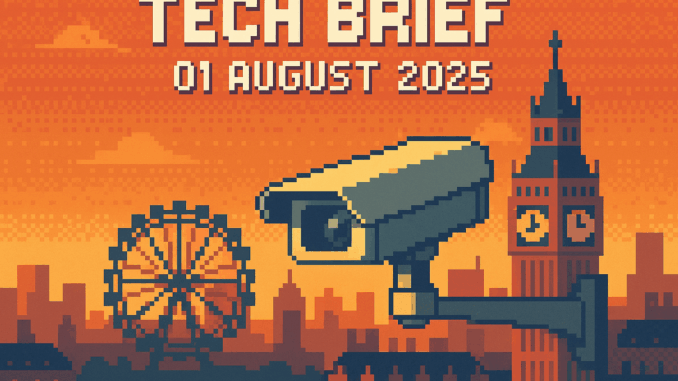
Tech Brief 1 August 2025 lands with a sharp question: how much of our digital world is actually under our control? From police deploying facial recognition on British streets to the latest twists in encryption policy, today’s stories are anything but background noise. Missed yesterday’s Tech Brief? Catch up here before diving in.
Met Police to Double Live Facial Recognition Deployments
“Smile, you’re on camera” used to be a joke, but now it’s a policy. The Metropolitan Police have announced plans to double their use of live facial recognition, aiming for ten deployments a week across London. They credit the tech with over 1,000 arrests, but privacy campaigners warn this is a step closer to mass surveillance. If you grew up in the 1990s, when CCTV was a novelty in most towns, the shift is jarring. The technology now uses AI to match faces to watchlists in real time, a leap from the grainy analogue footage of the past. The Met insists it targets only serious offenders, but critics argue the lines are blurring between targeted policing and blanket surveillance. For anyone who remembers early debates over digital rights, it’s a reminder that the privacy conversation is never really over.
Google Denies UK Encryption Backdoor Demands
A simple fact: Google has gone on record to say it has not received any requests from the UK government for an encryption backdoor, in contrast to recent allegations involving Apple. This is a relief for privacy advocates who remember the crypto wars of the 1990s, when PGP and GCHQ were headline news. Encryption is the process of scrambling data so only authorised users can read it, and the debate over government access is as old as the technology itself. The company’s public denial stands in stark contrast to the secretive approach often taken in these cases. With global implications for data security, the stakes are high. As above, the tension between public safety and personal privacy remains unresolved; the tools may have changed, but the arguments feel oddly familiar.
CMA Urges Faster Action on AWS and Microsoft Cloud Market Dominance
If you ever argued about the “browser wars” at a school computer club, this story’s for you. The UK’s Competition and Markets Authority (CMA) is pressing for swifter action against Amazon Web Services (AWS) and Microsoft, citing their hold over the UK cloud market. The cloud is just a way of storing and processing data remotely, but today’s giants have turned it into a new kind of monopoly. The CMA’s concerns reflect the old Microsoft antitrust battles, but now the fight is about who controls the servers behind nearly every app, website, and business tool. For anyone who remembers the rise of Windows and the fall of Netscape, including AOL’s 1999 acquisition and the final Navigator 9 release in 2007, it’s a familiar playbook with bigger stakes and more zeros on the balance sheet. The outcome will shape the digital landscape for years to come.
From the Wayback Machine
On This Day: 1981 – MTV launched in the United States as the first 24-hour music video channel. The debut opened with The Buggles’ “Video Killed the Radio Star,” and the channel’s VJs quickly became household names. MTV’s format, inspired by Top 40 radio, used satellite distribution and a rotation system. The channel’s early struggles, including limited playlists and criticism over lack of diversity, did not stop its influence. MTV’s impact can be seen today in platforms like YouTube and TikTok, where video and music are inseparable.
Today’s Big Question
Tech Brief 1 August 2025 leaves us with an open question: are we any closer to balancing innovation and individual rights, or just repeating the same debates with new technology? Whether it’s surveillance, encryption, or cloud monopolies, the past keeps nudging the present.
Stay curious, keep your backups, and don’t let anyone tell you the old debates are settled. Some things are worth fighting for, even if the kit looks different.
Missed yesterday’s Tech Brief? Catch up here

Leave a Reply